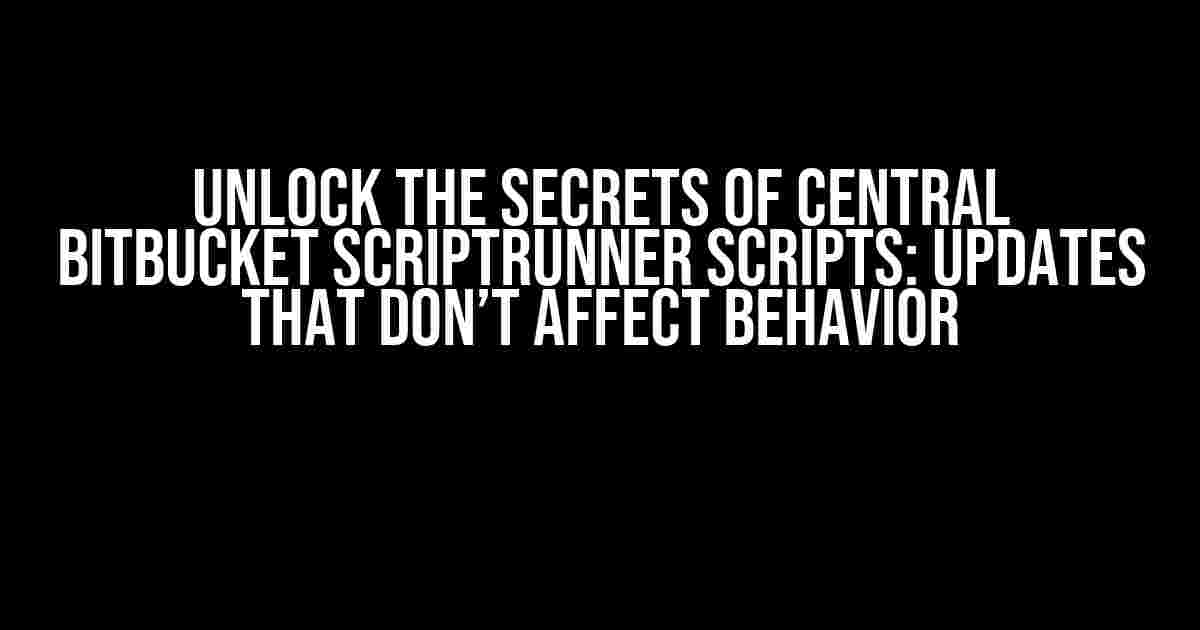Have you ever wondered why updates to your central Bitbucket ScriptRunner scripts don’t seem to be making a difference? You’re not alone! Many developers have encountered this frustrating phenomenon, where changes to central scripts don’t affect the behavior of their Bitbucket repository. In this article, we’ll delve into the reasons behind this issue and provide you with step-by-step instructions on how to troubleshoot and resolve it.
The Mystery of Central Scripts
Central Bitbucket ScriptRunner scripts are designed to provide a centralized way to manage and execute scripts across multiple repositories. They offer a convenient way to automate tasks, enforce best practices, and standardize workflows. However, when updates are made to these central scripts, they don’t always seem to take effect.
Why Updates Don’t Affect Behavior
There are several reasons why updates to central Bitbucket ScriptRunner scripts might not be affecting behavior:
- Cache Issues: Bitbucket caches script results to improve performance. Sometimes, this cache can get in the way of updates taking effect.
- ScriptRunner Configuration: Misconfigured ScriptRunner settings can prevent updates from being applied correctly.
- Repository Permissions: Insufficient permissions or incorrect repository settings can block updates from being applied.
- Script Syntax Errors: Syntax errors in the script itself can prevent updates from being executed.
Troubleshooting Steps
Now that we’ve identified the potential causes, let’s walk through the troubleshooting steps to resolve the issue:
Step 1: Clear the Cache
Clearing the cache is a simple yet effective way to ensure that updates take effect. To do this:
curl -X GET \
https://your-bitbucket-instance.com/rest/api/1.0/repos/your-repo-name/admin/scriptrunner/cache \
-H 'Authorization: Bearer your-bitbucket-token' \
-H 'Content-Type: application/json'
This command clears the cache for the specified repository. Make sure to replace “your-bitbucket-instance.com” and “your-repo-name” with your actual Bitbucket instance and repository names.
Step 2: Verify ScriptRunner Configuration
Double-check your ScriptRunner configuration to ensure that it’s set up correctly:
- Go to your Bitbucket repository’s Repository Settings > ScriptRunner.
- Verify that the central script is correctly configured and linked to the repository.
- Check the ScriptRunner Log for any error messages or warnings.
Step 3: Review Repository Permissions
Verify that the ScriptRunner user has the necessary permissions to execute scripts:
- Go to your Bitbucket repository’s Repository Settings > Permissions.
- Check that the ScriptRunner user has the Execute Scripts permission.
- Ensure that the repository’s ScriptRunner Settings are set to allow script execution.
Step 4: Check for Script Syntax Errors
Syntax errors in the script itself can prevent updates from being executed. To troubleshoot:
curl -X GET \
https://your-bitbucket-instance.com/rest/api/1.0/repos/your-repo-name/admin/scriptrunner/scripts \
-H 'Authorization: Bearer your-bitbucket-token' \
-H 'Content-Type: application/json'
This command retrieves the script code. Review the script for any syntax errors or issues.
Resolving the Issue
Once you’ve completed the troubleshooting steps, try updating the central script again. If the issue persists, consider the following:
ScriptRunner Script Limits
Bitbucket ScriptRunner has limits on the number of scripts that can be executed concurrently. If you’re hitting these limits, updates might not take effect. Consider optimizing your scripts or increasing the script limit.
Central Script Update Frequency
Central scripts are updated periodically by Bitbucket. If you’re making frequent updates, try increasing the update frequency or using a more efficient update mechanism.
ScriptRunner Support
If none of the above steps resolve the issue, reach out to Bitbucket ScriptRunner support for further assistance. They can help you identify the root cause and provide tailored solutions.
Conclusion
Updates to central Bitbucket ScriptRunner scripts not affecting behavior can be frustrating, but by following these troubleshooting steps and understanding the potential causes, you can resolve the issue and get your scripts working as intended. Remember to clear the cache, verify ScriptRunner configuration, review repository permissions, and check for script syntax errors. By doing so, you’ll be well on your way to unlocking the full potential of central ScriptRunner scripts.
| Common Issues | Solutions |
|---|---|
| Cache Issues | Clear the cache using the curl command |
| ScriptRunner Configuration | Verify ScriptRunner settings and link to repository |
| Repository Permissions | Ensure ScriptRunner user has Execute Scripts permission |
| Script Syntax Errors | Review script code for syntax errors |
By following this comprehensive guide, you’ll be able to troubleshoot and resolve issues with central Bitbucket ScriptRunner scripts, ensuring that updates take effect and your workflows run smoothly.
Frequently Asked Question
Get the scoop on why central Bitbucket ScriptRunner scripts aren’t changing the game – yet!
Why do my central Bitbucket ScriptRunner scripts not update?
Central scripts won’t update because they are cached by Bitbucket ScriptRunner. This caching mechanism ensures that your scripts load quickly, but it also means that changes to your central scripts won’t take effect immediately. Give it some time, or try clearing the cache to see the updates in action!
How long does it take for central scripts to update?
The waiting game! ScriptRunner scripts are cached for a short period, usually around 1-2 hours. If you’re eager to see the changes, you can try clearing the cache or waiting patiently for the cache to expire.
Can I force an update of my central scripts?
You want instant gratification! Yes, you can force an update by clearing the ScriptRunner cache. This will reload the scripts from the central repository, and you’ll see the changes take effect. Keep in mind that this might affect performance temporarily.
Why are my changes not reflected in the ScriptRunner logs?
The logs are lagging behind! The ScriptRunner logs might not reflect the changes immediately due to caching. Give it some time, and the logs should update with the new script changes. If you’re still stuck, try checking the ScriptRunner version or seeking help from the support team.
Are there any workarounds for this caching issue?
Time for a Plan B! If you’re experiencing frequent script changes, consider using a different approach like storing scripts in individual repositories or using a script repository manager. This way, you can bypass the caching issue and get your scripts updated in real-time.

